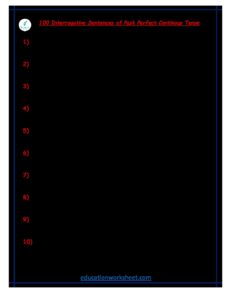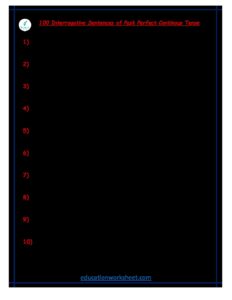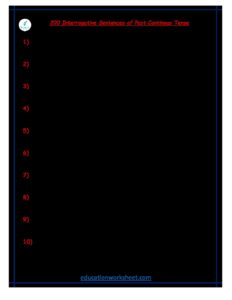Past Tense interrogative examples
Past Tense interrogative examples
Understanding Past Tense Interrogatives

Past tense interrogative sentences, as the name suggests, are questions that inquire about events or actions that took place in the past. They serve several purposes in language, such as seeking information, expressing curiosity, and narrating events. These sentences typically begin with an auxiliary verb (e.g., “did,” “was,” “were”) followed by the subject and the main verb in its base form. The structure of a past tense interrogative sentence can vary depending on the type of question, but it is essential to understand the fundamentals to use them effectively.
Types of Past Tense Interrogatives
Past tense interrogative sentences can be classified into several categories, each serving a distinct purpose. Here are some common types:
- Yes/No Questions:
- Did you visit Paris last summer?
- Was she at the party yesterday?
- Were they excited about the news?
- Wh-Questions:
- What did you eat for breakfast?
- Where were you when the earthquake occurred?
- When did he start his new job?
- Alternative Questions:
- Did you go to the beach or the mountains for vacation?
- Were you at the office, or did you work from home today?
- Did they watch a movie, or did they read a book?
- Tag Questions:
- You attended the conference last week, didn’t you?
- She enjoyed the concert, didn’t she?
- They finished the project on time, didn’t they?
Functions of Past Tense Interrogatives
Past tense interrogative sentences serve various functions in communication and storytelling:

- Seeking Information:
- Did you see the accident on the highway?
- What time did the flight depart?
- Expressing Curiosity:
- How did they manage to solve the mystery?
- Why were they so upset yesterday?
- Narrating Events:
- What happened after you left the party?
- Where were you when the storm hit?
- Confirming Assumptions:
- You met her at the conference, right?
- They didn’t forget the anniversary, did they?
- Emphasizing:
- You did finish your homework, didn’t you?
- She was at the meeting, wasn’t she?
Examples of Past Tense Interrogative Sentences
- Seeking Information:
- Did you find the lost keys in the living room?
- Where did you go for your last vacation?
- Did he call you after the interview?
- Expressing Curiosity:
- How did they discover the hidden treasure?
- Why were you absent from school last week?
- What did she say when she found out the surprise?
- Narrating Events:
- What happened after they left the restaurant?
- Where were you when the power outage occurred?
- Did they enjoy the fireworks display?
- Confirming Assumptions:
- You knew about the surprise party, didn’t you?
- She didn’t forget your birthday, did she?
- They were at the concert last night, right?
- Emphasizing:
- You did finish the report, didn’t you?
- She was at the meeting, wasn’t she?
- They did win the championship, didn’t they?
The Significance of Past Tense Interrogatives in Storytelling
Past tense interrogative sentences are powerful tools in storytelling. They allow authors to engage readers, build suspense, and uncover hidden details. Here are some ways past tense interrogatives enhance narrative:
- Engagement: By posing questions about past events, authors can draw readers into the story, making them curious about what happened and eager to learn more.
- Suspense: Authors can use past tense interrogatives to create tension and suspense. For example, “What really happened that night?” leaves readers eager to discover the truth.
- Revelation: Past tense interrogatives can be used to unveil critical information at strategic moments, such as, “Did you know that your best friend was behind it all along?”
- Character Development: Questions in the past tense can reveal characters’ motivations, secrets, and inner thoughts. “Why did he do that?” prompts a deeper exploration of a character’s actions.
- Reflecting on the Past: Past tense interrogatives help characters and readers reflect on past experiences, leading to personal growth and insight.
Examples of Past Tense Interrogatives in Fiction
- “Did she ever imagine that her life would take such a dramatic turn?”
- In this sentence, the author invites readers to contemplate the protagonist’s unexpected journey.
- “Where had he hidden the ancient map, and why did he keep it a secret for so long?”
- This question sets the stage for a treasure hunt and hints at the character’s mysterious motives.
- “How could they have known that their chance encounter would change the course of history?”
- This question introduces the theme of serendipity and foreshadows a significant event.
- “What had driven her to make that fateful decision on that rainy night?”
- The author uses this question to delve into the character’s motivations and emotional turmoil.
- “Had they ever suspected the truth about their enigmatic neighbor?”
- This question suggests a hidden truth about the neighbor and piques readers’ curiosity.
Past Tense Interrogatives in Non-Fiction

Past tense interrogatives are not limited to fiction; they are also vital in non-fiction writing, particularly in journalism and historical accounts. Here are examples:
- “Did the economic recession of 2008 have lasting consequences on global markets?”
- This question prompts an analysis of the long-term impact of the recession.
- “Where did the explorers set sail from on their historic journey?”
- This question is a fundamental inquiry in historical accounts, helping to establish context.
- “How did the scientific community react to the groundbreaking discovery?”
- Such questions provide insight into the reception of important scientific findings.
- “What factors contributed to the decline of the ancient civilization?”
- This question encourages an examination of historical causality.
- “Did the political turmoil of the 1960s shape the social movements of the era?”
- This question invites an exploration of the interconnectedness of historical events.
Conclusion
In the realm of language and communication, past tense interrogative sentences serve as invaluable tools for seeking information, expressing curiosity, narrating events, confirming assumptions, and emphasizing key points. Their importance extends beyond everyday conversation and is deeply ingrained in storytelling, both in fiction and non-fiction. Through the examples provided in this exploration, we have witnessed how past tense interrogatives engage readers, build suspense, and reveal essential details in narratives. Whether you are a writer, a storyteller, or a language enthusiast, mastering the art of past tense interrogatives is a skill worth honing, as it unlocks the power of questions to shape compelling and thought-provoking stories.
Past Tense interrogative examples Unveiling History Through Questions: Past Tense Interrogative Examples – Embark on an inquisitive exploration of times gone by, as we pose a series of questions that delve into the past tense. Uncover the stories, events, and experiences that have shaped our world and our understanding of it. Join us in this quest to unravel the mysteries of history and gain fresh perspectives on the narratives that have shaped human existence

